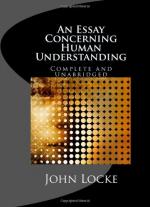
|
| Name: _________________________ | Period: ___________________ |
This test consists of 15 multiple choice questions and 5 short answer questions.
Multiple Choice Questions
1. What does Locke say the increase of our intellectual powers follows?
(a) Abstraction of ideas.
(b) Expansion of vocabulary.
(c) Simplification of ideas.
(d) Standardization of terminology.
2. What would happen if words referred to particular things, in Locke's opinion?
(a) No one would understand each other's vocabulary.
(b) There would have to be a word for each thing.
(c) No one would know that classes of things existed.
(d) Everyone would need to be an even larger language for classes of things.
3. Why don't most words refer to simple ideas, in Locke's account?
(a) Locke says that simple ideas are too pervasive.
(b) Locke says that most simple ideas are too unspecific.
(c) Locke says that there is too little room for interpretation in simple ideas.
(d) Locke says that most words are general.
4. How has God formed man, according to Locke?
(a) To be devout.
(b) To be self-seeking.
(c) To be sociable.
(d) To be warlike.
5. Where does Locke say our idea of number comes from?
(a) Our idea of unity.
(b) Our idea of derivation.
(c) Our idea of variety.
(d) Our idea of origins.
6. What does Locke say each distinct idea is?
(a) A word.
(b) An essence.
(c) A simple idea.
(d) A general idea.
7. What does Locke say is a philosopher's primary method, in Locke's account?
(a) Analysis.
(b) Experimentation.
(c) Debate.
(d) Reflection.
8. What do we have when an abstract idea cannot be broken down?
(a) Simple ideas.
(b) Complex ideas.
(c) Distinct ideas.
(d) Detailed words.
9. What does Locke say desires have in common?
(a) Unhappiness as a result.
(b) A motivating force to alleviate discomfort.
(c) Ineffability.
(d) The ability to mitigate unease.
10. What does Locke say allows us to see ourselves as free agents?
(a) Will.
(b) Fate.
(c) Desire.
(d) Determinism.
11. What can we talk about once we begin to abstract?
(a) Essences of things.
(b) Things in general.
(c) The context for things.
(d) Particular things.
12. Where does Locke say we see the origin of our idea of number?
(a) Trees in a forest.
(b) Grains of sand.
(c) Flocks of geese.
(d) Our bodies and minds.
13. What do we have when a word can no longer be defined, according to Locke?
(a) Simple ideas.
(b) Visions.
(c) Experience.
(d) The essence of an idea.
14. What is the limit toward which our idea of number extends, according to Locke?
(a) Ultimate variety.
(b) One.
(c) Infinity.
(d) Zero.
15. What is Locke really discussing in his discussion of pleasure and pain?
(a) Morality.
(b) Variety.
(c) Number.
(d) Complex modes of ideas.
Short Answer Questions
1. What does Locke say God gave man in order to fulfill his purpose?
2. What happens to the man in the illustration?
3. What does Locke's illustration show?
4. What does Locke say about the form of signs and words?
5. What makes philosophers think that people do not have free will?
|
This section contains 520 words (approx. 2 pages at 300 words per page) |

|




